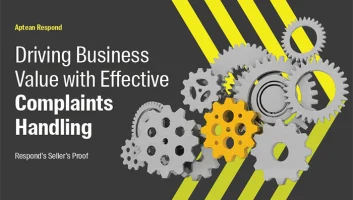Managing Complaints in the Gambling Industry: How Can Businesses Improve?
Managing Complaints in the Gambling Industry: How Can Businesses Improve?
Managing Complaints in the Gambling Industry: How Can Businesses Improve?
12 Mai 2023
Adam Dance
The Gambling Commission has hit the headlines in the UK recently, issuing a record fine for a repeated failure to protect consumers and weak anti-money laundering controls. This focus on player protection is a core tenet of the UK Government’s newly published gambling whitepaper, which has upped the ante in terms of what gambling firms could be expected to do to tackle and minimize harm to customers.
One area where gambling businesses can help to protect customers is managing complaints. The Gambling Commission requires businesses to have effective complaint handling processes and procedures in place, resolving issues in a timely manner and providing an audit trail of just how this has been achieved. If complaints aren’t done properly or transparently, businesses not only run the risk of attracting the attention of the Gambling Commission, but become prime targets for claims management companies, too.
Additionally, ineffective complaint handling can lead to an unsatisfactory customer experience and significant brand damage, causing current customers to take their business elsewhere and dissuading potential customers away from your brand. And, with more focus on the fair treatment of vulnerable customers in particular, good complaint management has a key role to play, helping to identify customer vulnerability and putting the right support in place.
As we explore in our recent whitepaper, harnessing complaints to drive continuous improvements and ensure compliance is becoming more commonplace, resulting in real, tangible benefits for gambling organizations. But complaint numbers and complaint complexity are on the up. Combine this with uncertainty about what the UK Government’s whitepaper will ultimately mean for the industry, and it’s not hard to see why so many gambling businesses are struggling to get complaints management right. So what can you be doing to improve managing complaints? Where is your organization lacking now and how can technology help?
Complaint Processes No Longer Fit For Purpose
Spreadsheets, in-house applications or Customer Relationship Management (CRM) solutions are proving to be no longer good enough, introducing inefficiencies and workarounds, unable to capture the breadth and depth of information needed and often not transparent enough to provide clear workload management and an audit trail. Also, an inability to drill down into complaints data makes it very difficult to undertake robust root cause analysis (RCA) to obtain the actionable insight that can improve your business and bottom line.
What’s needed is a process that supports your complaint handlers to secure good, fair outcomes every time. As well, you need the level of detail and analysis to inform real business change, while providing the traceability and auditability that regulatory requirements demand.
To achieve all this, more businesses are recognizing a need for a fit for purpose, dedicated complaint management solution.
Faster, More Efficient Complaint Handling with Good Outcomes
An integrated, centralized complaint management solution will manage the entire complaints process, with intelligent workflows guiding complaint handlers through the end-to-end complaint journey. It provides a single view of the complaint and the customer, capturing all information in a centralized location. And, by automating time-consuming and error-prone processes, the right solution can help to speed up your complaint handling too, leaving your team more time to focus on the needs of the customer in question.
Increased Transparency and Auditability
A good complaint management solution will provide the tools needed to extract the right information in the right format, delivering instant insight into crucial management information. Real-time reporting and accurate recordkeeping help to fulfil regulatory requirements. And, as we await confirmation as to just how far the proposed regulatory requirements for the UK gambling industry will actually go, this ability to automatically provide a precise and detailed audit trail of how outcomes are reached will put your gambling business ahead of the game, not only in terms of compliance, but in delivering a thorough understanding of your customers’ end-to-end complaint journeys.
Better Inform Continuous Business Improvements
With many gambling businesses ill-equipped to carry out RCA and therefore unable to not only resolve but even identify what could well be systemic issues, the right complaint management solution can make all the difference. By facilitating the recording of recurring themes and instances, with specific codes for certain issues, for example, the right solution makes the identification of wider issues and problems both quicker and easier. The results of such RCA can then inform organizational change, positioning your complaints function as a driver of continuous business improvements, deriving optimum value from the complaints data available.
Safeguard Vulnerable Customers
Whilst checks and balances might be in place to ensure the fair treatment of vulnerable customers, often the most difficult task is identifying customer vulnerability in the first place. Empowering frontline complaint teams to identify customer vulnerability is crucial. A good complaint management solution can augment staff skills, with intuitive software able to support every stage of your customer’s complaint journey, supplementing skill sets with intelligent workflows to ensure optimum outcomes for customers, whatever their circumstances. As well, vulnerability detection technology can boost the capabilities of your already skilled workforce to help ensure no vulnerable customers slip through the net.
The Time to Improve Complaint Handling is Now
In light of the publication of the Government’s proposals for the UK gambling industry, including potentially more stringent regulatory requirements, businesses can take proactive measures by implementing an effective complaint management system. This can lead to increased customer satisfaction and safety, thereby protecting the business's license and reputation. Additionally, utilizing valuable complaints data to its full potential can foster ongoing business-wide development, supporting advancements and enhancements to complaint handling processes, as well as driving improvements to products and services.
Having worked with complaints teams across multiple industries for over 30 years, Aptean understands the challenges posed by rising complaint levels and increasing complaint complexity, combined with ever-tighter regulation. With the right systems in place, it’s possible to nurture long-term customer relationships, managing complaints and leveraging feedback to drive real business improvements, all while optimizing customer service and helping to ensure water-tight compliance with even the most stringent of regulatory requirements.
For more information on how an effective complaint management system can help to improve your complaint handling, harnessing complaints to drive continuous improvements and underpin compliance, download our whitepaper or contact us today.
Related Articles


Prêt à transformer votre entreprise ?
Nous avons les solutions spécialisées qu'il vous faut pour relever les défis de votre secteur.






